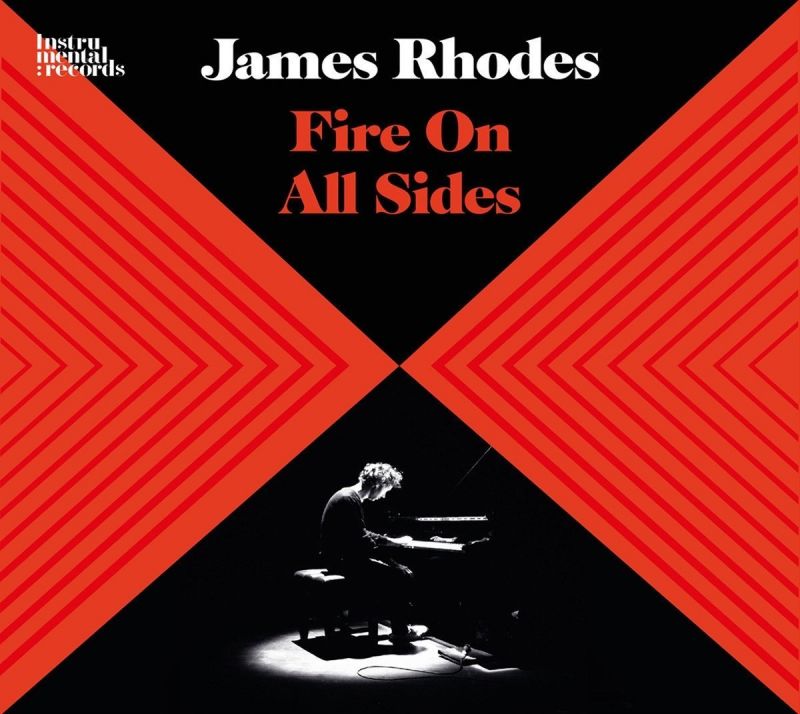James Rhodes: Fire on All Sides
View record and artist detailsRecord and Artist Details
Composer or Director: Sergey Rachmaninov, Fryderyk Chopin, Ludwig van Beethoven, Giacomo Puccini, Johann Sebastian Bach
Genre:
Instrumental
Label: Signum Classics
Magazine Review Date: 05/2018
Media Format: CD or Download
Media Runtime: 75
Mastering:
DDD
Catalogue Number: SIGCD494

Tracks:
| Composition | Artist Credit |
|---|---|
| (Das) Wohltemperierte Klavier, '(The) Well-Tempered Clavier, Movement: C, BWV846 |
Johann Sebastian Bach, Composer
James Rhodes, Piano Johann Sebastian Bach, Composer |
| Fantasie |
Fryderyk Chopin, Composer
Fryderyk Chopin, Composer James Rhodes, Piano |
| Polonaise-Fantaisie |
Fryderyk Chopin, Composer
Fryderyk Chopin, Composer James Rhodes, Piano |
| Sonata for Piano No. 31 |
Ludwig van Beethoven, Composer
James Rhodes, Piano Ludwig van Beethoven, Composer |
| Nocturnes, Movement: No. 17 in B, Op. 62/1 |
Fryderyk Chopin, Composer
Fryderyk Chopin, Composer James Rhodes, Piano |
| Nocturnes, Movement: No. 13 in C minor, Op. 48/1 |
Fryderyk Chopin, Composer
Fryderyk Chopin, Composer James Rhodes, Piano |
| (9) Etudes-tableaux, Movement: No. 5 in E flat minor |
Sergey Rachmaninov, Composer
James Rhodes, Piano Sergey Rachmaninov, Composer |
| (24) Preludes, Movement: D flat, Op. 32/13 |
Sergey Rachmaninov, Composer
James Rhodes, Piano Sergey Rachmaninov, Composer |
| Gianni Schicchi, Movement: O mio babbino caro |
Giacomo Puccini, Composer
Giacomo Puccini, Composer James Rhodes, Piano |
Author: Patrick Rucker
Among Rhodes’s most compelling attributes is his sensuously beautiful sound, particularly in the context of legato playing. Here it is heard to greatest advantage in Beethoven’s lyrical Op 110. If a tendency to join phrases diminishes the dramatic impact of the Recitative and ‘Klagende Lied’ which set the stage for the first fugue, Rhodes negotiates Beethoven’s thorny contrapuntal writing with considerable aplomb and clarity.
In the Fantaisie and the Polonaise-fantaisie, confusion over Chopin’s harmonic implications results in misplaced rhetorical emphases. Cross-rhythms are often fudged and transitions either exaggerated or rushed. In an overabundance of enthusiasm, Rhodes is prone to anticipate climaxes, robbing them of their full impact upon arrival. Extended fortissimo passages can sound brittle and hectic. Rhodes’s somewhat limited dynamic palette is particularly evident in the two Nocturnes, which are further undermined by rhythmic instability and the occasional misreading of note values.
These liabilities are only magnified in Rachmaninov. Rhodes is not the first pianist to bang his way through the mighty E flat minor Étude, as though heroic conflict could be evoked through the remorseless application of brute force. Distorted dynamics and phrase shapes combine with an underlying rhythmic uncertainty to render the valedictory grandeur of the D flat Prelude from Op 32 almost unrecognisable.
Discover the world's largest classical music catalogue with Presto Music.

Gramophone Digital Club
- Digital Edition
- Digital Archive
- Reviews Database
- Full website access
From £8.75 / month
Subscribe
Gramophone Full Club
- Print Edition
- Digital Edition
- Digital Archive
- Reviews Database
- Full website access
From £11.00 / month
Subscribe
If you are a library, university or other organisation that would be interested in an institutional subscription to Gramophone please click here for further information.




